Analysis of the UK Legal System for Business Law: Key Components
VerifiedAdded on 2023/06/17
|9
|3076
|344
Report
AI Summary
This report provides a comprehensive overview of the UK legal system for business law, covering classifications of law, sources of law, and the UK law-making process. It begins by defining laws and identifying the legal systems in the UK, then explains civil and criminal law with examples. The roles of the High Court and Supreme Court are discussed, followed by an explanation of case law and the legislation-making process, including delegated legislation. The report also addresses statutory duties of employers to their employees, wrongful dismissal, and unfair dismissal actions. This document is available on Desklib, a platform offering a wealth of study resources including past papers and solved assignments.
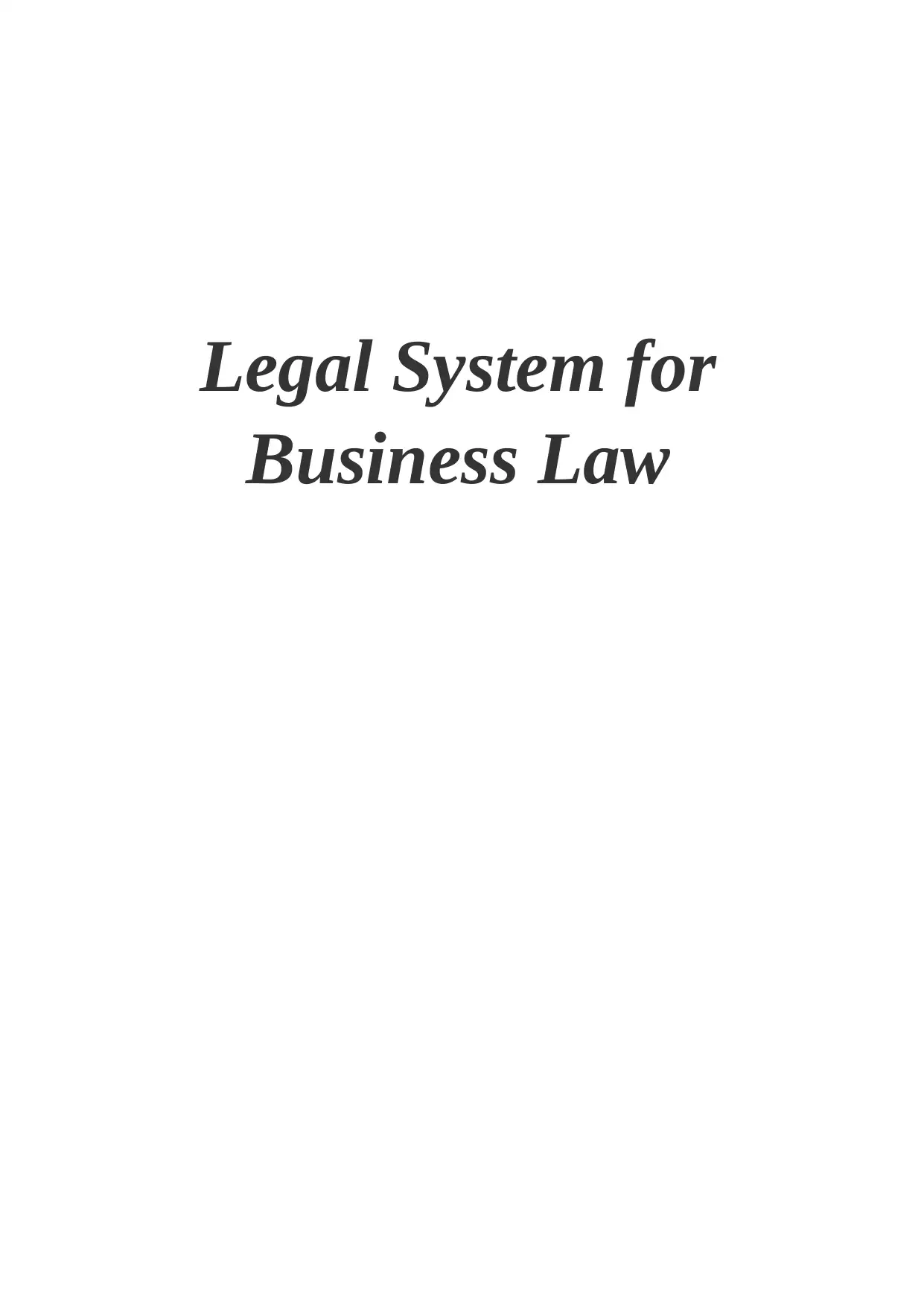
Legal System for
Business Law
Business Law
Paraphrase This Document
Need a fresh take? Get an instant paraphrase of this document with our AI Paraphraser
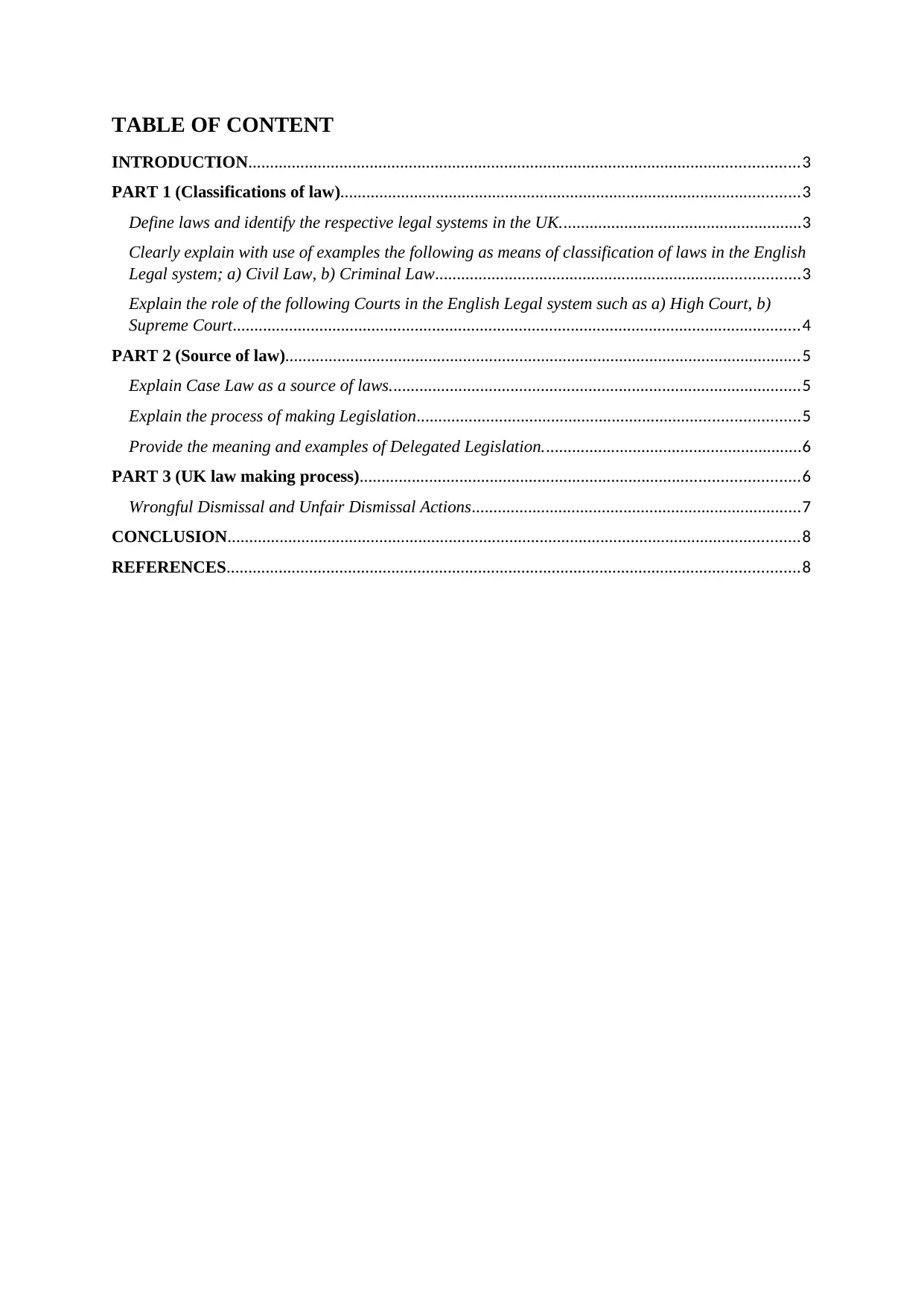
TABLE OF CONTENT
INTRODUCTION...............................................................................................................................3
PART 1 (Classifications of law)..........................................................................................................3
Define laws and identify the respective legal systems in the UK........................................................3
Clearly explain with use of examples the following as means of classification of laws in the English
Legal system; a) Civil Law, b) Criminal Law....................................................................................3
Explain the role of the following Courts in the English Legal system such as a) High Court, b)
Supreme Court...................................................................................................................................4
PART 2 (Source of law).......................................................................................................................5
Explain Case Law as a source of laws...............................................................................................5
Explain the process of making Legislation........................................................................................5
Provide the meaning and examples of Delegated Legislation............................................................6
PART 3 (UK law making process).....................................................................................................6
Wrongful Dismissal and Unfair Dismissal Actions............................................................................7
CONCLUSION....................................................................................................................................8
REFERENCES....................................................................................................................................8
INTRODUCTION...............................................................................................................................3
PART 1 (Classifications of law)..........................................................................................................3
Define laws and identify the respective legal systems in the UK........................................................3
Clearly explain with use of examples the following as means of classification of laws in the English
Legal system; a) Civil Law, b) Criminal Law....................................................................................3
Explain the role of the following Courts in the English Legal system such as a) High Court, b)
Supreme Court...................................................................................................................................4
PART 2 (Source of law).......................................................................................................................5
Explain Case Law as a source of laws...............................................................................................5
Explain the process of making Legislation........................................................................................5
Provide the meaning and examples of Delegated Legislation............................................................6
PART 3 (UK law making process).....................................................................................................6
Wrongful Dismissal and Unfair Dismissal Actions............................................................................7
CONCLUSION....................................................................................................................................8
REFERENCES....................................................................................................................................8
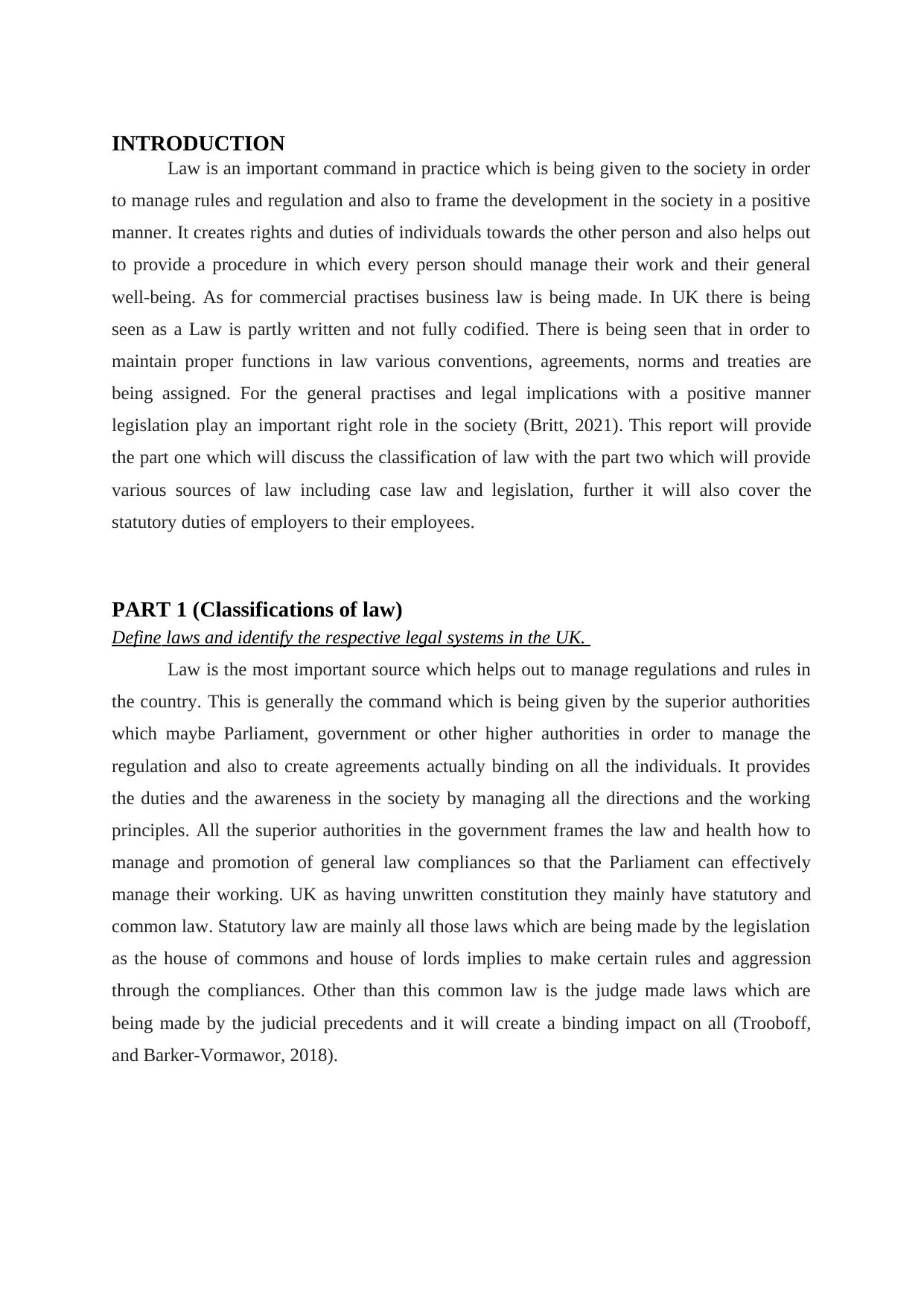
INTRODUCTION
Law is an important command in practice which is being given to the society in order
to manage rules and regulation and also to frame the development in the society in a positive
manner. It creates rights and duties of individuals towards the other person and also helps out
to provide a procedure in which every person should manage their work and their general
well-being. As for commercial practises business law is being made. In UK there is being
seen as a Law is partly written and not fully codified. There is being seen that in order to
maintain proper functions in law various conventions, agreements, norms and treaties are
being assigned. For the general practises and legal implications with a positive manner
legislation play an important right role in the society (Britt, 2021). This report will provide
the part one which will discuss the classification of law with the part two which will provide
various sources of law including case law and legislation, further it will also cover the
statutory duties of employers to their employees.
PART 1 (Classifications of law)
Define laws and identify the respective legal systems in the UK.
Law is the most important source which helps out to manage regulations and rules in
the country. This is generally the command which is being given by the superior authorities
which maybe Parliament, government or other higher authorities in order to manage the
regulation and also to create agreements actually binding on all the individuals. It provides
the duties and the awareness in the society by managing all the directions and the working
principles. All the superior authorities in the government frames the law and health how to
manage and promotion of general law compliances so that the Parliament can effectively
manage their working. UK as having unwritten constitution they mainly have statutory and
common law. Statutory law are mainly all those laws which are being made by the legislation
as the house of commons and house of lords implies to make certain rules and aggression
through the compliances. Other than this common law is the judge made laws which are
being made by the judicial precedents and it will create a binding impact on all (Trooboff,
and Barker-Vormawor, 2018).
Law is an important command in practice which is being given to the society in order
to manage rules and regulation and also to frame the development in the society in a positive
manner. It creates rights and duties of individuals towards the other person and also helps out
to provide a procedure in which every person should manage their work and their general
well-being. As for commercial practises business law is being made. In UK there is being
seen as a Law is partly written and not fully codified. There is being seen that in order to
maintain proper functions in law various conventions, agreements, norms and treaties are
being assigned. For the general practises and legal implications with a positive manner
legislation play an important right role in the society (Britt, 2021). This report will provide
the part one which will discuss the classification of law with the part two which will provide
various sources of law including case law and legislation, further it will also cover the
statutory duties of employers to their employees.
PART 1 (Classifications of law)
Define laws and identify the respective legal systems in the UK.
Law is the most important source which helps out to manage regulations and rules in
the country. This is generally the command which is being given by the superior authorities
which maybe Parliament, government or other higher authorities in order to manage the
regulation and also to create agreements actually binding on all the individuals. It provides
the duties and the awareness in the society by managing all the directions and the working
principles. All the superior authorities in the government frames the law and health how to
manage and promotion of general law compliances so that the Parliament can effectively
manage their working. UK as having unwritten constitution they mainly have statutory and
common law. Statutory law are mainly all those laws which are being made by the legislation
as the house of commons and house of lords implies to make certain rules and aggression
through the compliances. Other than this common law is the judge made laws which are
being made by the judicial precedents and it will create a binding impact on all (Trooboff,
and Barker-Vormawor, 2018).
⊘ This is a preview!⊘
Do you want full access?
Subscribe today to unlock all pages.

Trusted by 1+ million students worldwide
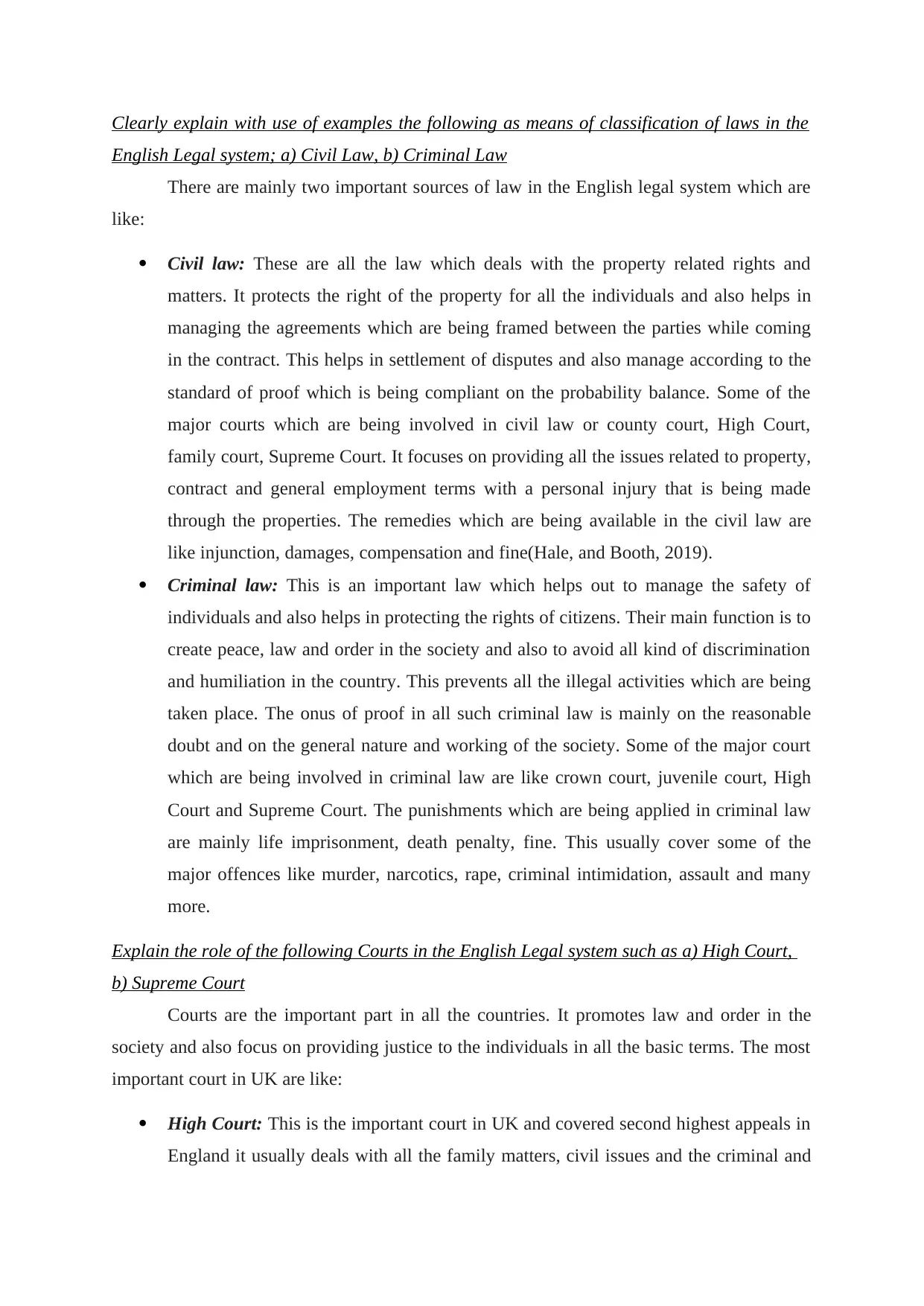
Clearly explain with use of examples the following as means of classification of laws in the
English Legal system; a) Civil Law, b) Criminal Law
There are mainly two important sources of law in the English legal system which are
like:
Civil law: These are all the law which deals with the property related rights and
matters. It protects the right of the property for all the individuals and also helps in
managing the agreements which are being framed between the parties while coming
in the contract. This helps in settlement of disputes and also manage according to the
standard of proof which is being compliant on the probability balance. Some of the
major courts which are being involved in civil law or county court, High Court,
family court, Supreme Court. It focuses on providing all the issues related to property,
contract and general employment terms with a personal injury that is being made
through the properties. The remedies which are being available in the civil law are
like injunction, damages, compensation and fine(Hale, and Booth, 2019).
Criminal law: This is an important law which helps out to manage the safety of
individuals and also helps in protecting the rights of citizens. Their main function is to
create peace, law and order in the society and also to avoid all kind of discrimination
and humiliation in the country. This prevents all the illegal activities which are being
taken place. The onus of proof in all such criminal law is mainly on the reasonable
doubt and on the general nature and working of the society. Some of the major court
which are being involved in criminal law are like crown court, juvenile court, High
Court and Supreme Court. The punishments which are being applied in criminal law
are mainly life imprisonment, death penalty, fine. This usually cover some of the
major offences like murder, narcotics, rape, criminal intimidation, assault and many
more.
Explain the role of the following Courts in the English Legal system such as a) High Court,
b) Supreme Court
Courts are the important part in all the countries. It promotes law and order in the
society and also focus on providing justice to the individuals in all the basic terms. The most
important court in UK are like:
High Court: This is the important court in UK and covered second highest appeals in
England it usually deals with all the family matters, civil issues and the criminal and
English Legal system; a) Civil Law, b) Criminal Law
There are mainly two important sources of law in the English legal system which are
like:
Civil law: These are all the law which deals with the property related rights and
matters. It protects the right of the property for all the individuals and also helps in
managing the agreements which are being framed between the parties while coming
in the contract. This helps in settlement of disputes and also manage according to the
standard of proof which is being compliant on the probability balance. Some of the
major courts which are being involved in civil law or county court, High Court,
family court, Supreme Court. It focuses on providing all the issues related to property,
contract and general employment terms with a personal injury that is being made
through the properties. The remedies which are being available in the civil law are
like injunction, damages, compensation and fine(Hale, and Booth, 2019).
Criminal law: This is an important law which helps out to manage the safety of
individuals and also helps in protecting the rights of citizens. Their main function is to
create peace, law and order in the society and also to avoid all kind of discrimination
and humiliation in the country. This prevents all the illegal activities which are being
taken place. The onus of proof in all such criminal law is mainly on the reasonable
doubt and on the general nature and working of the society. Some of the major court
which are being involved in criminal law are like crown court, juvenile court, High
Court and Supreme Court. The punishments which are being applied in criminal law
are mainly life imprisonment, death penalty, fine. This usually cover some of the
major offences like murder, narcotics, rape, criminal intimidation, assault and many
more.
Explain the role of the following Courts in the English Legal system such as a) High Court,
b) Supreme Court
Courts are the important part in all the countries. It promotes law and order in the
society and also focus on providing justice to the individuals in all the basic terms. The most
important court in UK are like:
High Court: This is the important court in UK and covered second highest appeals in
England it usually deals with all the family matters, civil issues and the criminal and
Paraphrase This Document
Need a fresh take? Get an instant paraphrase of this document with our AI Paraphraser
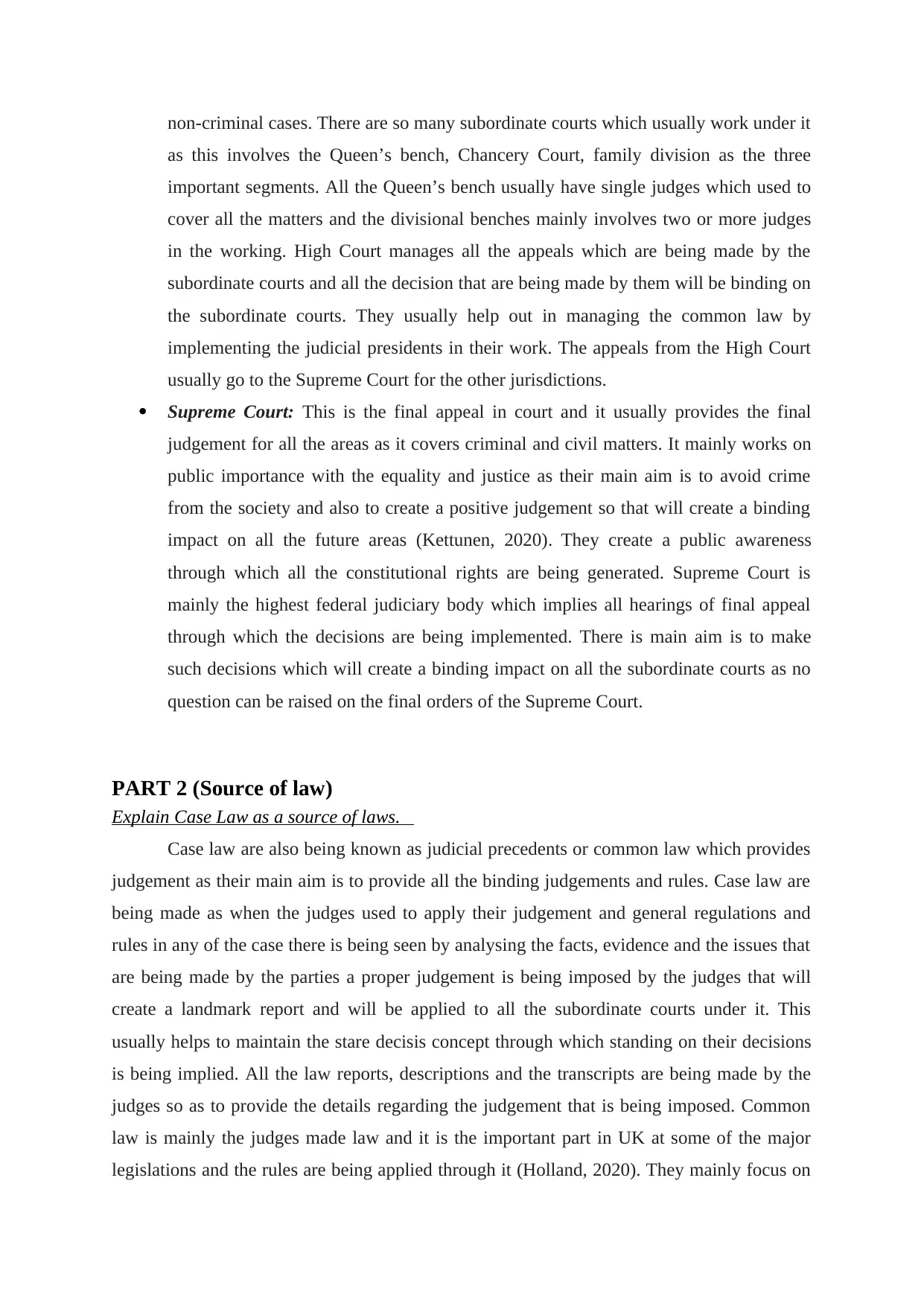
non-criminal cases. There are so many subordinate courts which usually work under it
as this involves the Queen’s bench, Chancery Court, family division as the three
important segments. All the Queen’s bench usually have single judges which used to
cover all the matters and the divisional benches mainly involves two or more judges
in the working. High Court manages all the appeals which are being made by the
subordinate courts and all the decision that are being made by them will be binding on
the subordinate courts. They usually help out in managing the common law by
implementing the judicial presidents in their work. The appeals from the High Court
usually go to the Supreme Court for the other jurisdictions.
Supreme Court: This is the final appeal in court and it usually provides the final
judgement for all the areas as it covers criminal and civil matters. It mainly works on
public importance with the equality and justice as their main aim is to avoid crime
from the society and also to create a positive judgement so that will create a binding
impact on all the future areas (Kettunen, 2020). They create a public awareness
through which all the constitutional rights are being generated. Supreme Court is
mainly the highest federal judiciary body which implies all hearings of final appeal
through which the decisions are being implemented. There is main aim is to make
such decisions which will create a binding impact on all the subordinate courts as no
question can be raised on the final orders of the Supreme Court.
PART 2 (Source of law)
Explain Case Law as a source of laws.
Case law are also being known as judicial precedents or common law which provides
judgement as their main aim is to provide all the binding judgements and rules. Case law are
being made as when the judges used to apply their judgement and general regulations and
rules in any of the case there is being seen by analysing the facts, evidence and the issues that
are being made by the parties a proper judgement is being imposed by the judges that will
create a landmark report and will be applied to all the subordinate courts under it. This
usually helps to maintain the stare decisis concept through which standing on their decisions
is being implied. All the law reports, descriptions and the transcripts are being made by the
judges so as to provide the details regarding the judgement that is being imposed. Common
law is mainly the judges made law and it is the important part in UK at some of the major
legislations and the rules are being applied through it (Holland, 2020). They mainly focus on
as this involves the Queen’s bench, Chancery Court, family division as the three
important segments. All the Queen’s bench usually have single judges which used to
cover all the matters and the divisional benches mainly involves two or more judges
in the working. High Court manages all the appeals which are being made by the
subordinate courts and all the decision that are being made by them will be binding on
the subordinate courts. They usually help out in managing the common law by
implementing the judicial presidents in their work. The appeals from the High Court
usually go to the Supreme Court for the other jurisdictions.
Supreme Court: This is the final appeal in court and it usually provides the final
judgement for all the areas as it covers criminal and civil matters. It mainly works on
public importance with the equality and justice as their main aim is to avoid crime
from the society and also to create a positive judgement so that will create a binding
impact on all the future areas (Kettunen, 2020). They create a public awareness
through which all the constitutional rights are being generated. Supreme Court is
mainly the highest federal judiciary body which implies all hearings of final appeal
through which the decisions are being implemented. There is main aim is to make
such decisions which will create a binding impact on all the subordinate courts as no
question can be raised on the final orders of the Supreme Court.
PART 2 (Source of law)
Explain Case Law as a source of laws.
Case law are also being known as judicial precedents or common law which provides
judgement as their main aim is to provide all the binding judgements and rules. Case law are
being made as when the judges used to apply their judgement and general regulations and
rules in any of the case there is being seen by analysing the facts, evidence and the issues that
are being made by the parties a proper judgement is being imposed by the judges that will
create a landmark report and will be applied to all the subordinate courts under it. This
usually helps to maintain the stare decisis concept through which standing on their decisions
is being implied. All the law reports, descriptions and the transcripts are being made by the
judges so as to provide the details regarding the judgement that is being imposed. Common
law is mainly the judges made law and it is the important part in UK at some of the major
legislations and the rules are being applied through it (Holland, 2020). They mainly focus on
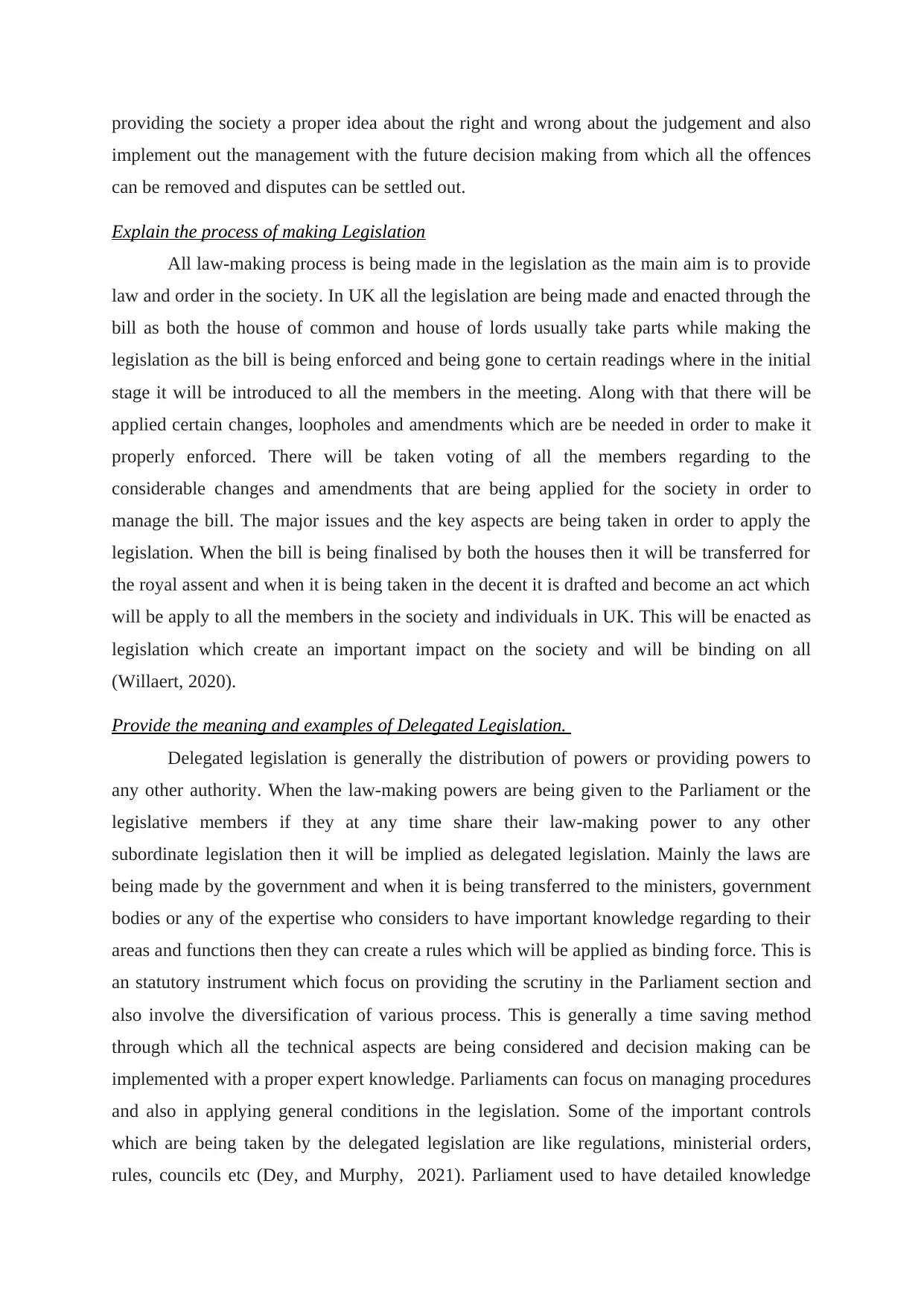
providing the society a proper idea about the right and wrong about the judgement and also
implement out the management with the future decision making from which all the offences
can be removed and disputes can be settled out.
Explain the process of making Legislation
All law-making process is being made in the legislation as the main aim is to provide
law and order in the society. In UK all the legislation are being made and enacted through the
bill as both the house of common and house of lords usually take parts while making the
legislation as the bill is being enforced and being gone to certain readings where in the initial
stage it will be introduced to all the members in the meeting. Along with that there will be
applied certain changes, loopholes and amendments which are be needed in order to make it
properly enforced. There will be taken voting of all the members regarding to the
considerable changes and amendments that are being applied for the society in order to
manage the bill. The major issues and the key aspects are being taken in order to apply the
legislation. When the bill is being finalised by both the houses then it will be transferred for
the royal assent and when it is being taken in the decent it is drafted and become an act which
will be apply to all the members in the society and individuals in UK. This will be enacted as
legislation which create an important impact on the society and will be binding on all
(Willaert, 2020).
Provide the meaning and examples of Delegated Legislation.
Delegated legislation is generally the distribution of powers or providing powers to
any other authority. When the law-making powers are being given to the Parliament or the
legislative members if they at any time share their law-making power to any other
subordinate legislation then it will be implied as delegated legislation. Mainly the laws are
being made by the government and when it is being transferred to the ministers, government
bodies or any of the expertise who considers to have important knowledge regarding to their
areas and functions then they can create a rules which will be applied as binding force. This is
an statutory instrument which focus on providing the scrutiny in the Parliament section and
also involve the diversification of various process. This is generally a time saving method
through which all the technical aspects are being considered and decision making can be
implemented with a proper expert knowledge. Parliaments can focus on managing procedures
and also in applying general conditions in the legislation. Some of the important controls
which are being taken by the delegated legislation are like regulations, ministerial orders,
rules, councils etc (Dey, and Murphy, 2021). Parliament used to have detailed knowledge
implement out the management with the future decision making from which all the offences
can be removed and disputes can be settled out.
Explain the process of making Legislation
All law-making process is being made in the legislation as the main aim is to provide
law and order in the society. In UK all the legislation are being made and enacted through the
bill as both the house of common and house of lords usually take parts while making the
legislation as the bill is being enforced and being gone to certain readings where in the initial
stage it will be introduced to all the members in the meeting. Along with that there will be
applied certain changes, loopholes and amendments which are be needed in order to make it
properly enforced. There will be taken voting of all the members regarding to the
considerable changes and amendments that are being applied for the society in order to
manage the bill. The major issues and the key aspects are being taken in order to apply the
legislation. When the bill is being finalised by both the houses then it will be transferred for
the royal assent and when it is being taken in the decent it is drafted and become an act which
will be apply to all the members in the society and individuals in UK. This will be enacted as
legislation which create an important impact on the society and will be binding on all
(Willaert, 2020).
Provide the meaning and examples of Delegated Legislation.
Delegated legislation is generally the distribution of powers or providing powers to
any other authority. When the law-making powers are being given to the Parliament or the
legislative members if they at any time share their law-making power to any other
subordinate legislation then it will be implied as delegated legislation. Mainly the laws are
being made by the government and when it is being transferred to the ministers, government
bodies or any of the expertise who considers to have important knowledge regarding to their
areas and functions then they can create a rules which will be applied as binding force. This is
an statutory instrument which focus on providing the scrutiny in the Parliament section and
also involve the diversification of various process. This is generally a time saving method
through which all the technical aspects are being considered and decision making can be
implemented with a proper expert knowledge. Parliaments can focus on managing procedures
and also in applying general conditions in the legislation. Some of the important controls
which are being taken by the delegated legislation are like regulations, ministerial orders,
rules, councils etc (Dey, and Murphy, 2021). Parliament used to have detailed knowledge
⊘ This is a preview!⊘
Do you want full access?
Subscribe today to unlock all pages.

Trusted by 1+ million students worldwide
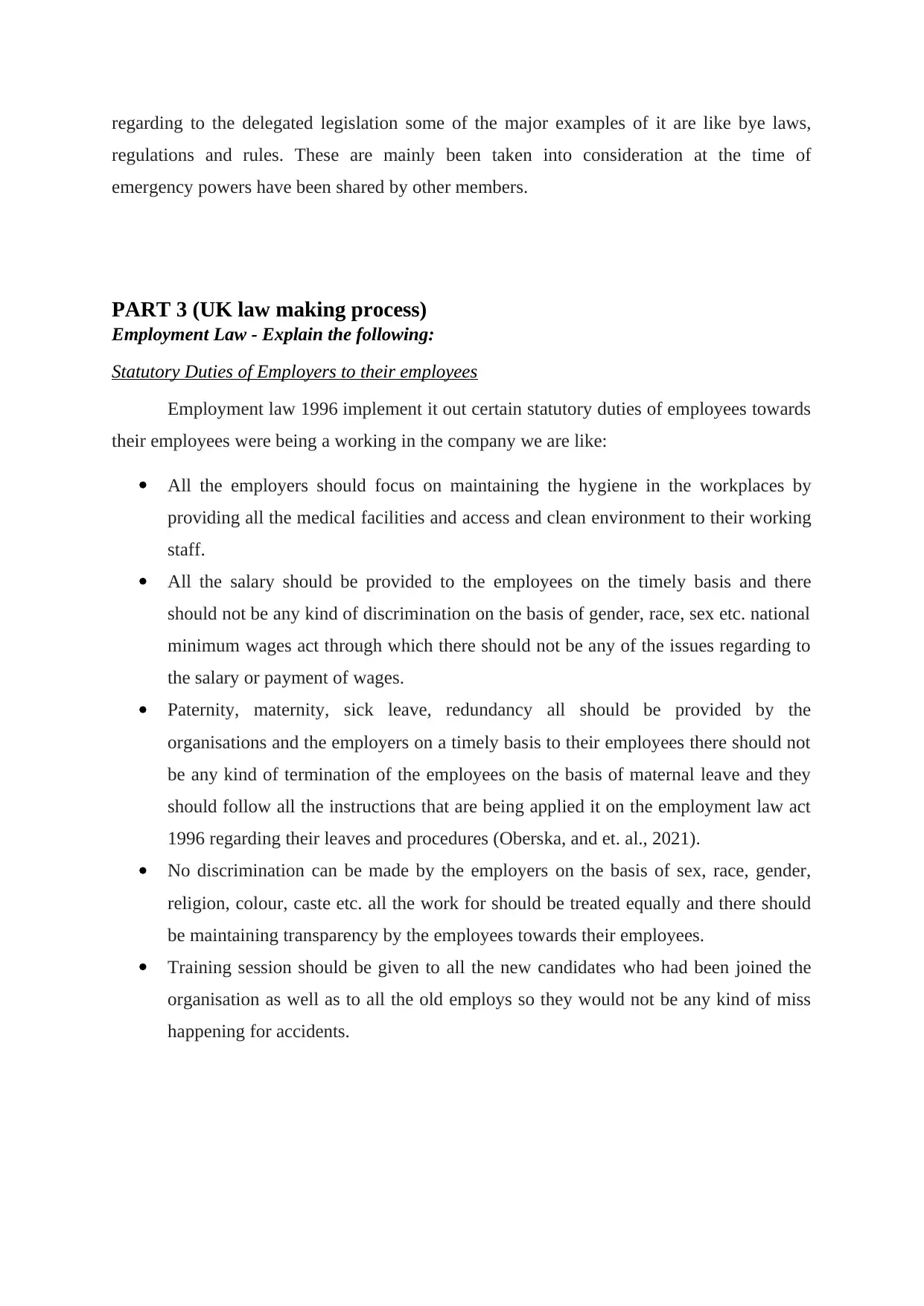
regarding to the delegated legislation some of the major examples of it are like bye laws,
regulations and rules. These are mainly been taken into consideration at the time of
emergency powers have been shared by other members.
PART 3 (UK law making process)
Employment Law - Explain the following:
Statutory Duties of Employers to their employees
Employment law 1996 implement it out certain statutory duties of employees towards
their employees were being a working in the company we are like:
All the employers should focus on maintaining the hygiene in the workplaces by
providing all the medical facilities and access and clean environment to their working
staff.
All the salary should be provided to the employees on the timely basis and there
should not be any kind of discrimination on the basis of gender, race, sex etc. national
minimum wages act through which there should not be any of the issues regarding to
the salary or payment of wages.
Paternity, maternity, sick leave, redundancy all should be provided by the
organisations and the employers on a timely basis to their employees there should not
be any kind of termination of the employees on the basis of maternal leave and they
should follow all the instructions that are being applied it on the employment law act
1996 regarding their leaves and procedures (Oberska, and et. al., 2021).
No discrimination can be made by the employers on the basis of sex, race, gender,
religion, colour, caste etc. all the work for should be treated equally and there should
be maintaining transparency by the employees towards their employees.
Training session should be given to all the new candidates who had been joined the
organisation as well as to all the old employs so they would not be any kind of miss
happening for accidents.
regulations and rules. These are mainly been taken into consideration at the time of
emergency powers have been shared by other members.
PART 3 (UK law making process)
Employment Law - Explain the following:
Statutory Duties of Employers to their employees
Employment law 1996 implement it out certain statutory duties of employees towards
their employees were being a working in the company we are like:
All the employers should focus on maintaining the hygiene in the workplaces by
providing all the medical facilities and access and clean environment to their working
staff.
All the salary should be provided to the employees on the timely basis and there
should not be any kind of discrimination on the basis of gender, race, sex etc. national
minimum wages act through which there should not be any of the issues regarding to
the salary or payment of wages.
Paternity, maternity, sick leave, redundancy all should be provided by the
organisations and the employers on a timely basis to their employees there should not
be any kind of termination of the employees on the basis of maternal leave and they
should follow all the instructions that are being applied it on the employment law act
1996 regarding their leaves and procedures (Oberska, and et. al., 2021).
No discrimination can be made by the employers on the basis of sex, race, gender,
religion, colour, caste etc. all the work for should be treated equally and there should
be maintaining transparency by the employees towards their employees.
Training session should be given to all the new candidates who had been joined the
organisation as well as to all the old employs so they would not be any kind of miss
happening for accidents.
Paraphrase This Document
Need a fresh take? Get an instant paraphrase of this document with our AI Paraphraser
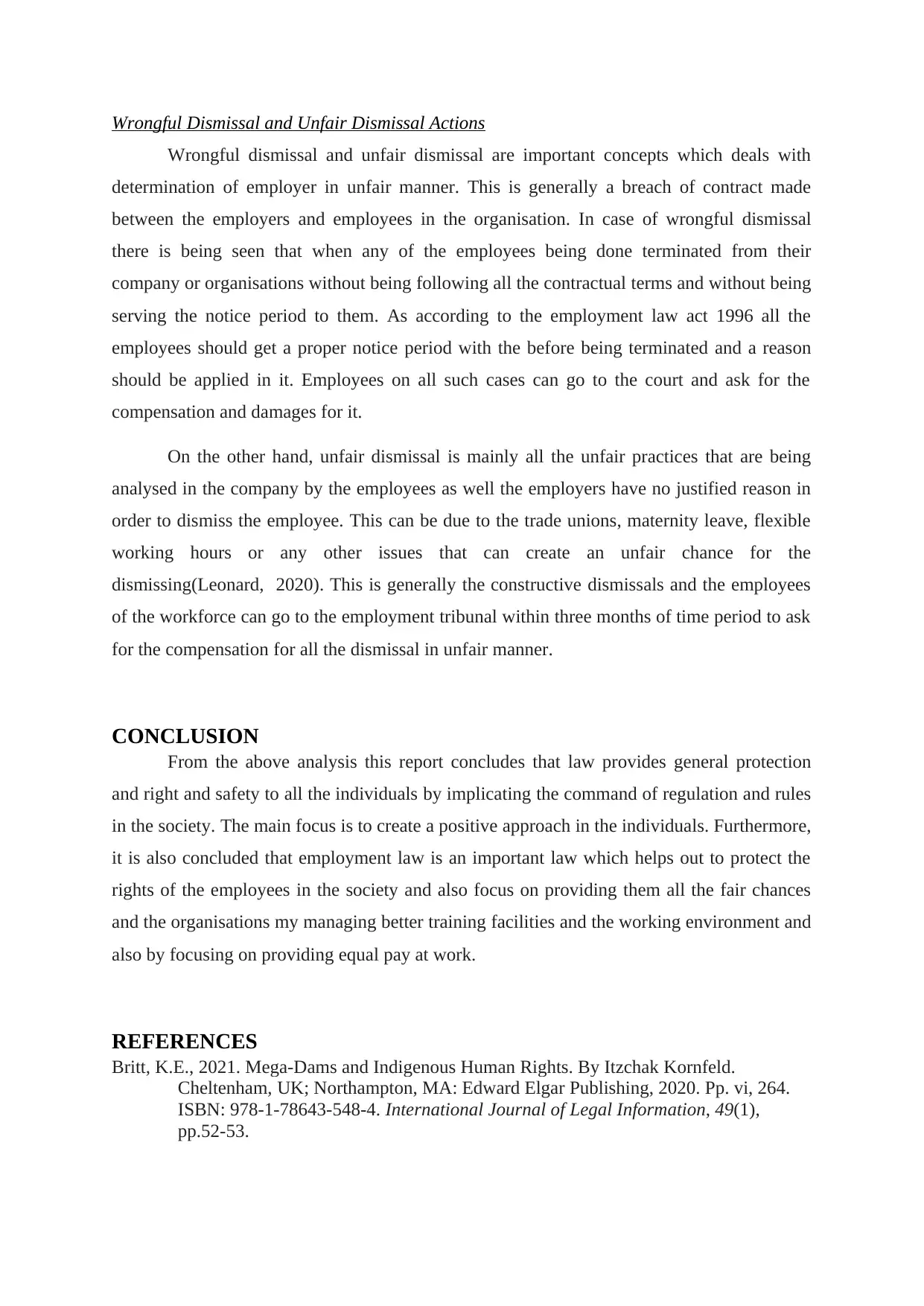
Wrongful Dismissal and Unfair Dismissal Actions
Wrongful dismissal and unfair dismissal are important concepts which deals with
determination of employer in unfair manner. This is generally a breach of contract made
between the employers and employees in the organisation. In case of wrongful dismissal
there is being seen that when any of the employees being done terminated from their
company or organisations without being following all the contractual terms and without being
serving the notice period to them. As according to the employment law act 1996 all the
employees should get a proper notice period with the before being terminated and a reason
should be applied in it. Employees on all such cases can go to the court and ask for the
compensation and damages for it.
On the other hand, unfair dismissal is mainly all the unfair practices that are being
analysed in the company by the employees as well the employers have no justified reason in
order to dismiss the employee. This can be due to the trade unions, maternity leave, flexible
working hours or any other issues that can create an unfair chance for the
dismissing(Leonard, 2020). This is generally the constructive dismissals and the employees
of the workforce can go to the employment tribunal within three months of time period to ask
for the compensation for all the dismissal in unfair manner.
CONCLUSION
From the above analysis this report concludes that law provides general protection
and right and safety to all the individuals by implicating the command of regulation and rules
in the society. The main focus is to create a positive approach in the individuals. Furthermore,
it is also concluded that employment law is an important law which helps out to protect the
rights of the employees in the society and also focus on providing them all the fair chances
and the organisations my managing better training facilities and the working environment and
also by focusing on providing equal pay at work.
REFERENCES
Britt, K.E., 2021. Mega-Dams and Indigenous Human Rights. By Itzchak Kornfeld.
Cheltenham, UK; Northampton, MA: Edward Elgar Publishing, 2020. Pp. vi, 264.
ISBN: 978-1-78643-548-4. International Journal of Legal Information, 49(1),
pp.52-53.
Wrongful dismissal and unfair dismissal are important concepts which deals with
determination of employer in unfair manner. This is generally a breach of contract made
between the employers and employees in the organisation. In case of wrongful dismissal
there is being seen that when any of the employees being done terminated from their
company or organisations without being following all the contractual terms and without being
serving the notice period to them. As according to the employment law act 1996 all the
employees should get a proper notice period with the before being terminated and a reason
should be applied in it. Employees on all such cases can go to the court and ask for the
compensation and damages for it.
On the other hand, unfair dismissal is mainly all the unfair practices that are being
analysed in the company by the employees as well the employers have no justified reason in
order to dismiss the employee. This can be due to the trade unions, maternity leave, flexible
working hours or any other issues that can create an unfair chance for the
dismissing(Leonard, 2020). This is generally the constructive dismissals and the employees
of the workforce can go to the employment tribunal within three months of time period to ask
for the compensation for all the dismissal in unfair manner.
CONCLUSION
From the above analysis this report concludes that law provides general protection
and right and safety to all the individuals by implicating the command of regulation and rules
in the society. The main focus is to create a positive approach in the individuals. Furthermore,
it is also concluded that employment law is an important law which helps out to protect the
rights of the employees in the society and also focus on providing them all the fair chances
and the organisations my managing better training facilities and the working environment and
also by focusing on providing equal pay at work.
REFERENCES
Britt, K.E., 2021. Mega-Dams and Indigenous Human Rights. By Itzchak Kornfeld.
Cheltenham, UK; Northampton, MA: Edward Elgar Publishing, 2020. Pp. vi, 264.
ISBN: 978-1-78643-548-4. International Journal of Legal Information, 49(1),
pp.52-53.
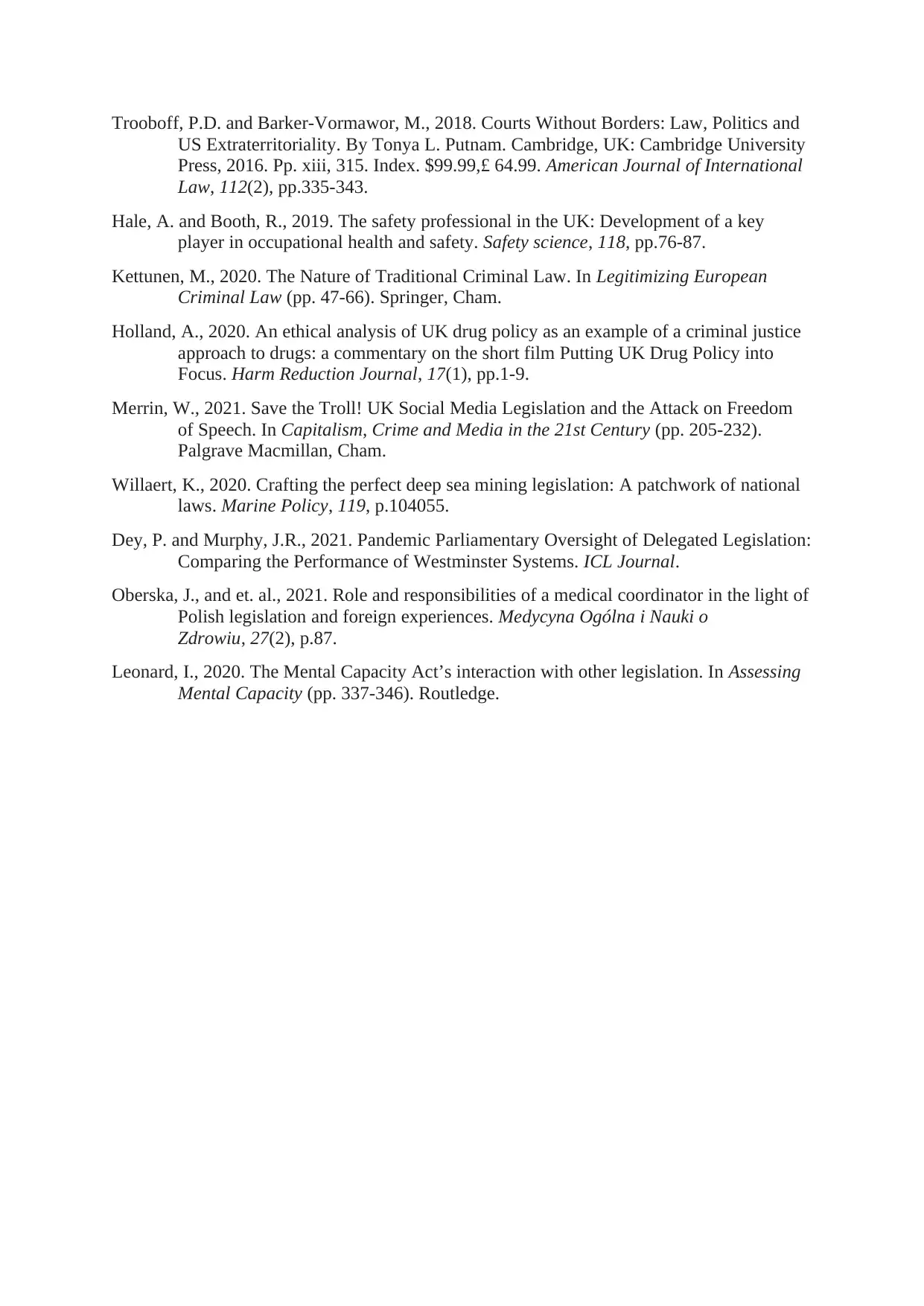
Trooboff, P.D. and Barker-Vormawor, M., 2018. Courts Without Borders: Law, Politics and
US Extraterritoriality. By Tonya L. Putnam. Cambridge, UK: Cambridge University
Press, 2016. Pp. xiii, 315. Index. $99.99,£ 64.99. American Journal of International
Law, 112(2), pp.335-343.
Hale, A. and Booth, R., 2019. The safety professional in the UK: Development of a key
player in occupational health and safety. Safety science, 118, pp.76-87.
Kettunen, M., 2020. The Nature of Traditional Criminal Law. In Legitimizing European
Criminal Law (pp. 47-66). Springer, Cham.
Holland, A., 2020. An ethical analysis of UK drug policy as an example of a criminal justice
approach to drugs: a commentary on the short film Putting UK Drug Policy into
Focus. Harm Reduction Journal, 17(1), pp.1-9.
Merrin, W., 2021. Save the Troll! UK Social Media Legislation and the Attack on Freedom
of Speech. In Capitalism, Crime and Media in the 21st Century (pp. 205-232).
Palgrave Macmillan, Cham.
Willaert, K., 2020. Crafting the perfect deep sea mining legislation: A patchwork of national
laws. Marine Policy, 119, p.104055.
Dey, P. and Murphy, J.R., 2021. Pandemic Parliamentary Oversight of Delegated Legislation:
Comparing the Performance of Westminster Systems. ICL Journal.
Oberska, J., and et. al., 2021. Role and responsibilities of a medical coordinator in the light of
Polish legislation and foreign experiences. Medycyna Ogólna i Nauki o
Zdrowiu, 27(2), p.87.
Leonard, I., 2020. The Mental Capacity Act’s interaction with other legislation. In Assessing
Mental Capacity (pp. 337-346). Routledge.
US Extraterritoriality. By Tonya L. Putnam. Cambridge, UK: Cambridge University
Press, 2016. Pp. xiii, 315. Index. $99.99,£ 64.99. American Journal of International
Law, 112(2), pp.335-343.
Hale, A. and Booth, R., 2019. The safety professional in the UK: Development of a key
player in occupational health and safety. Safety science, 118, pp.76-87.
Kettunen, M., 2020. The Nature of Traditional Criminal Law. In Legitimizing European
Criminal Law (pp. 47-66). Springer, Cham.
Holland, A., 2020. An ethical analysis of UK drug policy as an example of a criminal justice
approach to drugs: a commentary on the short film Putting UK Drug Policy into
Focus. Harm Reduction Journal, 17(1), pp.1-9.
Merrin, W., 2021. Save the Troll! UK Social Media Legislation and the Attack on Freedom
of Speech. In Capitalism, Crime and Media in the 21st Century (pp. 205-232).
Palgrave Macmillan, Cham.
Willaert, K., 2020. Crafting the perfect deep sea mining legislation: A patchwork of national
laws. Marine Policy, 119, p.104055.
Dey, P. and Murphy, J.R., 2021. Pandemic Parliamentary Oversight of Delegated Legislation:
Comparing the Performance of Westminster Systems. ICL Journal.
Oberska, J., and et. al., 2021. Role and responsibilities of a medical coordinator in the light of
Polish legislation and foreign experiences. Medycyna Ogólna i Nauki o
Zdrowiu, 27(2), p.87.
Leonard, I., 2020. The Mental Capacity Act’s interaction with other legislation. In Assessing
Mental Capacity (pp. 337-346). Routledge.
⊘ This is a preview!⊘
Do you want full access?
Subscribe today to unlock all pages.

Trusted by 1+ million students worldwide
1 out of 9
Related Documents
Your All-in-One AI-Powered Toolkit for Academic Success.
+13062052269
info@desklib.com
Available 24*7 on WhatsApp / Email
![[object Object]](/_next/static/media/star-bottom.7253800d.svg)
Unlock your academic potential
Copyright © 2020–2025 A2Z Services. All Rights Reserved. Developed and managed by ZUCOL.


